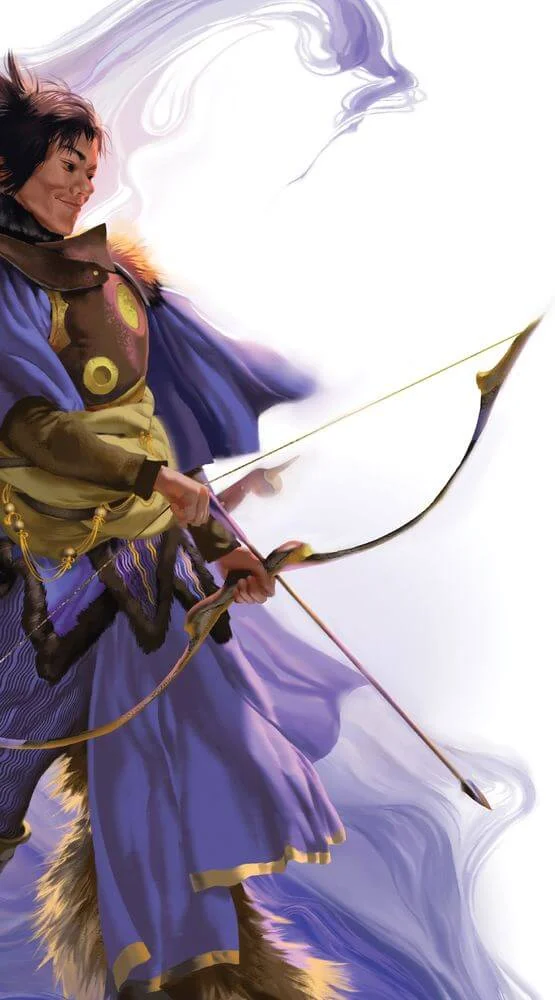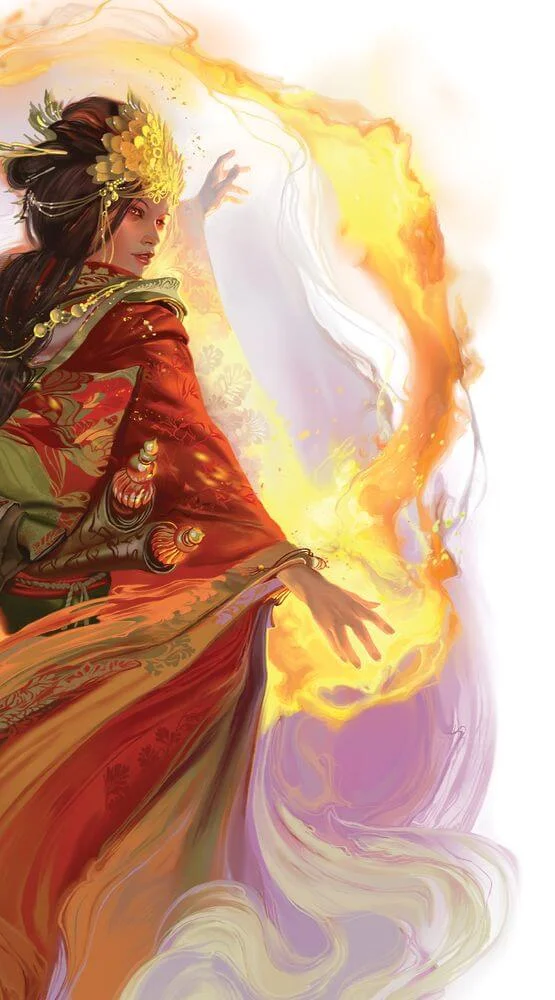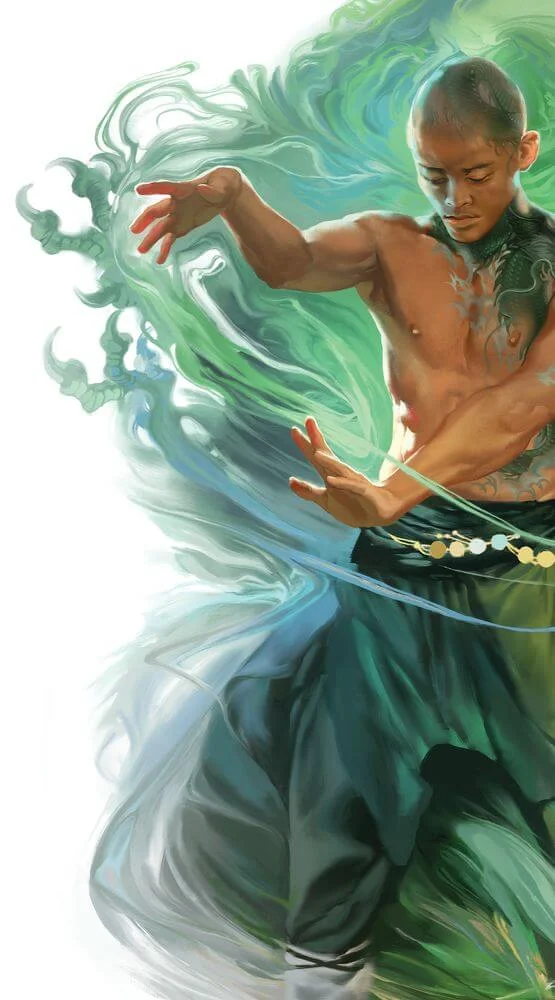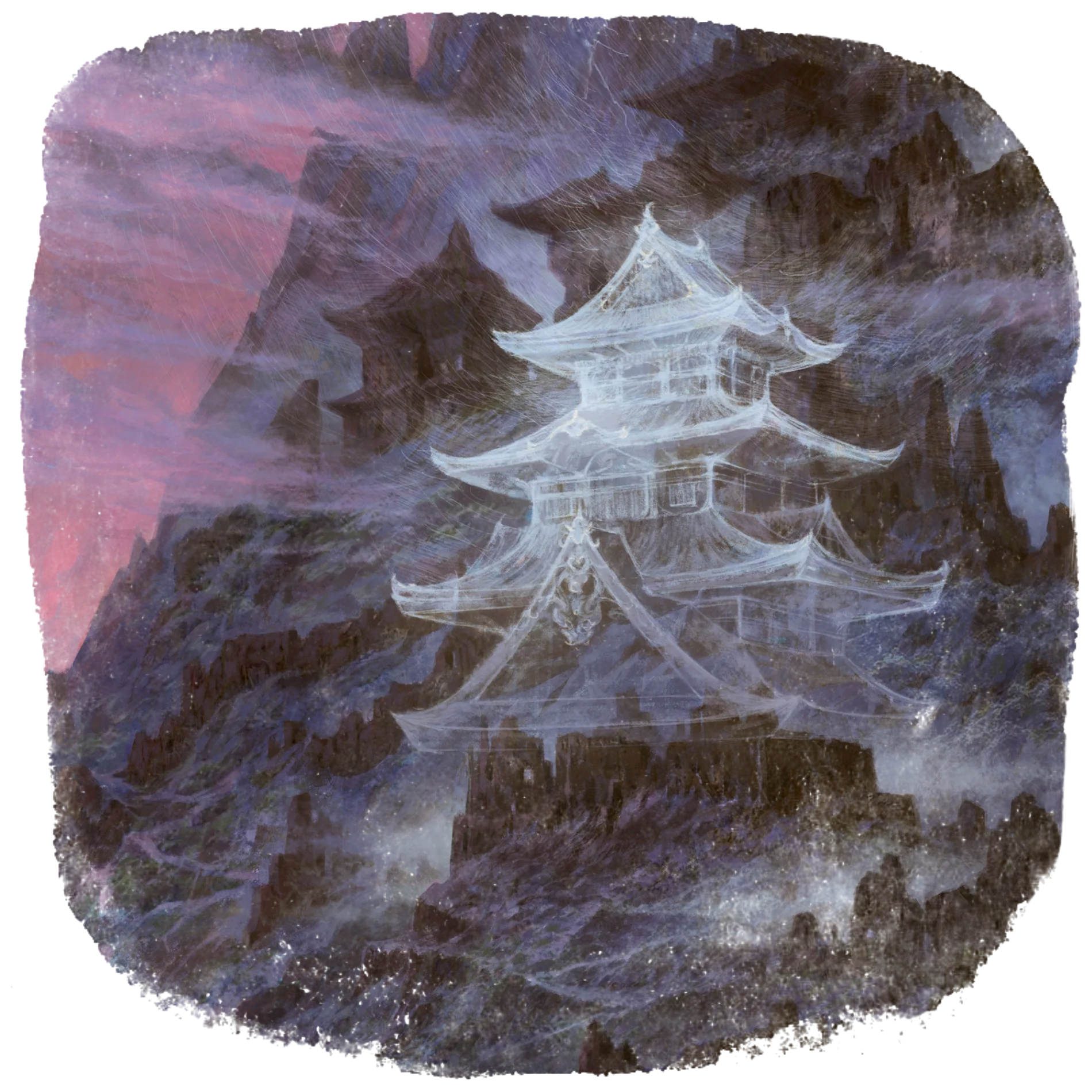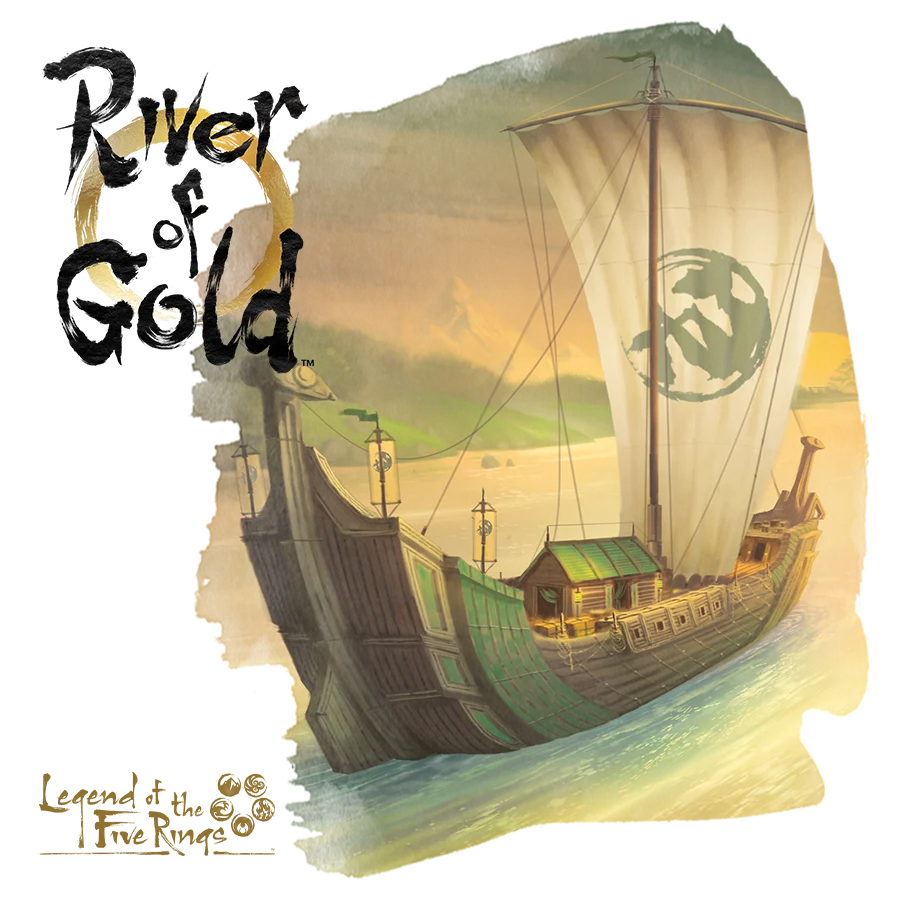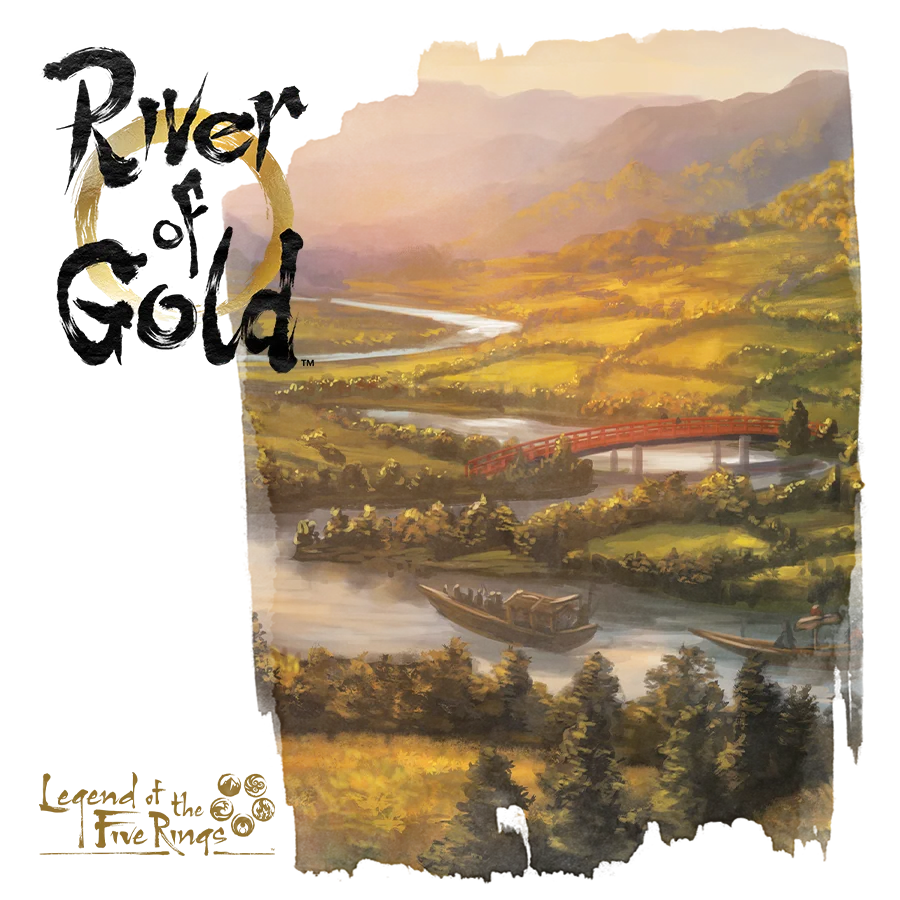The Parable of the Wolf and the Unicorn
The children of the ordu demand a story and Moto Chotan knows just the one to tell her unruly charges to remind them family must always come first.
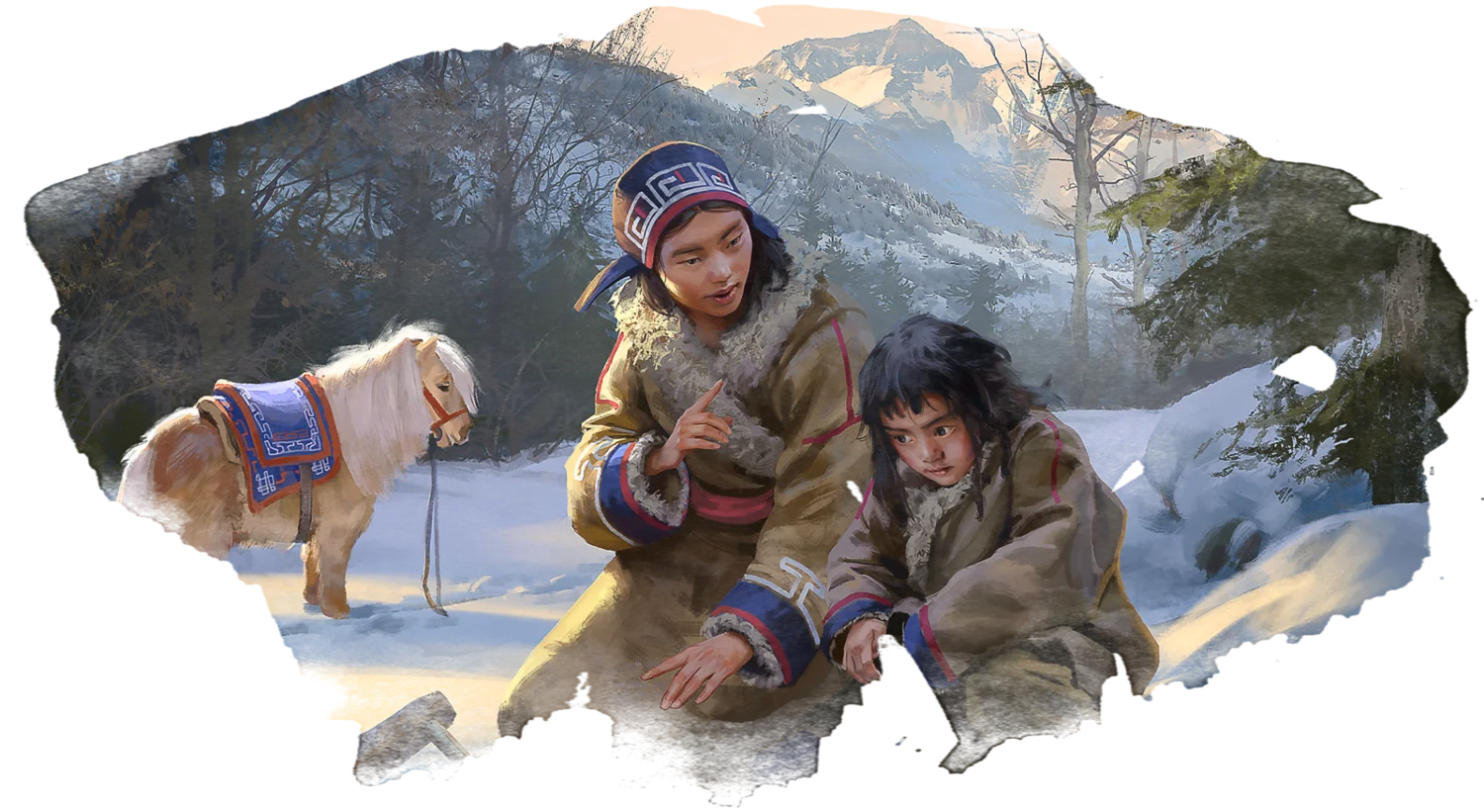
The children of the ordu demand a story and Moto Chotan knows just the one to tell her unruly charges to remind them family must always come first, in this new tale of the Unicorn Clan from Aconyte Books.
Read or listen below, and sign up to the Legend of the Five Rings newsletter and subscribe to the Aconyte Fiction Podcast to make sure you catch the rest of the series.
The Parable of the Wolf and the Unicorn
A Tale of the Unicorn Clan
by Daniel Lovat Clark
The natural state of the ordu was noise. Dogs barked, horses whickered or went trotting past with their hooves clopping on the packed earth, sheep and goats brayed. But the sound that always grounded Moto Chotan in place – wherever that place would happen to be, as the ordu shifted about season by season – the one that made her feel as alive as the smell of the earth and sky, was the children.
Laughing, screaming, running at speed from one side of the ordu to the other, the pack of children that ran through the encampment like wild dogs were a constant presence, aurally. Even when they were hard at work on their chores, even when their mothers and aunties and uncles managed to make them sit still long enough for a lesson, they were always there. They were what transformed the ordu from a war camp to a home.
But they were also a blasted nuisance sometimes.
“Tell us a story, grandmother!”
“A story! A story!”
“A story? Not while there are still sheep to tend and horses to groom!” Chotan tutted over the children as she hauled herself to her feet with a gnarled blackwood cane. “I have no time for stories, little ones.”
“I’ll tend to the sheep, grandmother!”
“I’ll groom the horses!”
“And me!”
And so the shrieking horde of children dispersed again. Chotan kept her smile to herself as she added dried manure to the fire outside her yurt – something more than a tent, less than a house. Chotan identified with the yurt as she, too, could be wrestled onto a cart and dragged long distances, but only with difficulty. Her hips were not what they had once been. Riding a horse was no longer an option. Her body had softened and stiffened with age, but her tongue remained sharp and agile as ever.
She didn’t know precisely when she’d become the ordu’s principal storyteller, the wisest and most respected elder in the community. Probably about the time everyone started calling her “grandmother” instead of “auntie.” She didn’t mind, not anymore. The things she’d once cared so much about seemed less and less important every day. Now a warm bed, a strong drink, and a comfortable seat by the fire were more valuable than glory for her family, victory on the battlefield, a fast horse, a lover’s smile. That, and the children.
Some of the children were her actual grandchildren, although she couldn’t have said precisely which ones. Others were more distant kin, cousins and grandnieces, or even the children of lesser families, or servants and vassals. They were loud, to be sure, and fast, and somewhat sticky, and brave and in all ways perfect Moto. Even the occasional guests and fosters from the other families, the ones who lived in their castles and villages, visiting among the Moto to learn the old ways of the nomadic Ujik of the Plains of Wind and Stone. They might be Shinjo or Ide, but for now they were Moto. They would make fine warriors someday, and hunters and herders and all the rest.
“Tell us a story, grandmother!” That one was a boy of maybe nine, stocky and round-faced. Chotan thought he might have been a grandson, and everyone called him Big Rabbit.
“One with magic!” said a chirping bird of a girl, a cousin, Chotan thought, called Logun.
“No,” said Big Rabbit. “One with battles! And action!”
“Tell us a story about brave warriors!” said Jamu, an intense boy whose eyes always fixed unblinkingly on Chotan’s face whenever she spoke.
“I will tell you the story of the Wolf and the Unicorn,” said Chotan. She stood and poured a libation of mare’s milk into the fire, where it spat and hissed and smoked. A symbol of life, sacrificed to death, the never-ending cycle of nature. She thrust her hand into the smoke, watching it twist around her as it rose into the darkening sky. “Let my words rise to the sky, let the heavens hear them and know them to be true.”
The children drew silent as she performed her ritual and the anticipation of the story settled around them. Chotan smiled and sat back down. Her libation might be pleasing to the Lords of Death, although she was not some priestess to know the ways of the gods. But it was certainly an effective way to bring the audience into the circle of her story.
“The Wolf was a mighty hunter and a mighty warrior,” said Chotan. “He would snap up rabbits without a thought.” Here, she leaned toward Big Rabbit and made her best wolf face, causing the children to shriek and lean away from her. “He brought down deer heedless of their antlers. He even did battle with the mighty lions of the plains and came away the victor. All who lived upon the plains knew of his great power, and they feared his anger.”
“Who is the Wolf, grandmother?” asked Logun. “Is he the Moto Khan?”
“It’s just a story,” snarled Big Rabbit. “Not everything is about everything.”
“But it’ll have a moral, stupid,” insisted Logun.
“Be quiet,” hissed Jamu. “I want to hear the story.”
“One day,” said Chotan, smirking, “a powerful Unicorn came to the plains with her large herd. When the Wolf heard of their arrival, he came stalking to see what this newcomer was, and whether she was a rival or prey. The Hawk and the Hare warned him that the Unicorn had strange powers, but the Wolf wasn’t afraid. His jaws ran thick with slaver as he loped across the plains, hungry for a meal and more importantly – a challenge.”
“I bet the Unicorn is Lady Shinjo,” whispered Logun.
“Shh!” said Jamu.
“The Unicorn is just a unicorn,” insisted Big Rabbit.
“Shh!” said Jamu, finger to his lips.
“The Wolf came upon a hill and saw the herd of the Unicorn spread out before him. Legions of horses, young and old, grazed peacefully on the plains or galloped about with their manes streaming in the wind. The Unicorn stood calmly on a rise above them, watching the Wolf with unconcerned eyes.
“To the Wolf, this was as good as a challenge. How dare the Unicorn parade such a feast before him, as if the Wolf were no threat? How dare the Unicorn meet his eyes with no fear? The Wolf resolved on the spot to gobble up the Unicorn’s herd and destroy her once and for all.”
Chotan paused to take a sip of water, watching the rapt faces of the children all around. Sometimes the children exploded with the need to talk, to interrupt, to experience the story with their whole bodies. Other times, one simply had to create an emptiness – the children would soon fill it.
“I bet the Wolf ate them all up,” whispered one child.
“Nuh-uh,” whispered another. “The Unicorn are our clan, remember? The Unicorn has to win.”
“So the Wolf leaped to the attack, rushing at the nearest group of young, tender horses. His teeth flashed in the dark, his jaws ached with the hunger of the hunt, his song tore the sky as he charged. But as he approached the young and vulnerable horses, he heard the thunder of hooves. A stallion and several mares galloped past, rushing in a tight circle around the Wolf’s prey. He snarled and snapped, shifting his target from the young foals to the horses guarding them, but the horses were large and strong, and their constant movement meant he could not single one out, could not find a safe angle from which to attack.
“The Wolf’s hunt had failed. He retreated, tail bristling with anger, and saw the Unicorn. She had not moved from her spot, and she watched him intently with eyes that shone like stars.
“‘I will return,’ vowed the Wolf. ‘And I will not be denied. I will feast upon your young and your old, your weak and your strong, until your entire herd is gone.’
“‘You will try,’ said the Unicorn. ‘And strong as you are, you will discover that there is something stronger still.’”
“She’s talking about the gods, right? The Lords of Death, the Fortunes, the Divine Siblings, and all the rest?” asked one child, shivering as if with cold.
“Nuh-uh,” said another. “She means herself. She means the Unicorn is stronger than the Wolf!”
“Don’t be stupid,” said Big Rabbit, shoving the offending child off their seat. “No one is stronger than the Wolf.”
“The Lords of Death are,” said Jamu. “Everyone dies. Even the Wolf. That’s the natural order.”
“But the Wolf is a killer,” said Big Rabbit. “He’s closer to the Lords of Death than anyone. He knows death and he isn’t afraid!” Rabbit grabbed hold of Jamu and drove his knuckles into the smaller boy’s scalp. “You have to live while you can! The Lords of Death can wait!”
Chotan hid her smirk behind another sip of water as a brief wrestling match threatened to overwhelm her story. But the noise of the grapplers faded as her story resumed, the combatants frozen mid-battle and gradually drifting to seated positions of focused attention.
“The Wolf did not stay away long. He knew that the horses would come together to defend the weakest among them, so he had a new plan – a simple plan, to be sure, but the Wolf was confident. He would simply frighten the horses until they broke and ran, then pick off the weak one by one. He had used this strategy many times before when faced with a difficult quarry. The Wolf knew that his howl and his growl and his bared fangs were enough to frighten even powerful creatures like the ox and the lion.
“So the Wolf waited for night to fall and began to howl, his song echoing from the moon and across the plains. The grass shuddered under the force of his mighty voice, and beasts of all sorts started awake from their rest, hearts thundering in their chests. From his vantage point in the long grass, the Wolf could see that the horses were becoming nervous.
“The Wolf stalked forward, growling in the darkness. The closest horses shifted and stepped back, their ears lying flat against their heads. Their eyes rolled. They were on the verge of panic. They could smell the Wolf. They could hear him. But they could not see where he was.
“But as they drew closer together, young and weak in the center, strong and hale on the outside, the horses seemed to draw comfort and strength from one another. The Wolf stalked a wide circle around them, growling and howling, but none of the horses broke. He couldn’t find an opening in their defense. At last, he approached the smallest and weakest of the guards. ‘Flee,’ he growled. ‘I am the Wolf. I am the mightiest hunter on the plains. If you stay and fight, I will surely kill you.’
“‘You might,’ said the smallest horse. ‘But if you do, my brothers and sisters will kick you and bite you to death.’
“‘What will that matter to you?’ growled the Wolf. ‘You’ll be dead!’
“‘But the herd will survive,’ said the smallest horse. ‘If I run, others may run, and then you can pick them off one by one. But as long as I do my duty and have faith in my herd, then even if I die, we can never be defeated.’
“The Wolf growled and howled as much as he pleased. The horses never faltered. And so the Wolf slunk away again, and again his eyes met the Unicorn’s, still standing on her hill.
“‘Surely you understand,’ said the Unicorn. ‘Wolves are pack hunters. You must know that the pack is stronger than any one beast alone.’
“That’s right!” The words burst from Jamu’s lips like a bird startled from the brush. “Wolves are pack hunters! Where is the Wolf’s pack?”
“This wolf is a lone wolf,” explained Logun. “Haven’t you ever heard of a lone wolf before?”
“The Wolf was, indeed, a lone wolf,” said Chotan. “No pack for him, arrogant in his own power as he was. He’d never consent to share in the rewards of a kill, neither the meat nor the glory. But this vexatious herd of the Unicorn was strong, he had to admit. Oh, the Wolf was sure that he could beat any one of them, even the Unicorn herself, in a fight, but how was he to bring that about?” She leaned forward as she spoke, turning to catch the eye of each member of her rapt audience – it seemed to have grown since she started, Chotan noticed. Even some adults were loitering at the edge of the firelight, cleaning their hooked lances and patching the leather of their Ujik-style armor as if they weren’t listening raptly.
“He couldn’t get his jaws around the problem. So he watched,” she said, pulling down on her eyelid to make her eye bulge. “He listened,” she said, cupping one hand around her ear. “He smelled,” she said, sniffing loudly to the giggles of the children. “And he noticed. He noticed that the Unicorn’s herd wasn’t all horses. Aside from the Unicorn herself, there were cows and sheep and even hardy northern deer, traveling in their own families but unmistakably part of the same herd. A dangerous idea took hold in his predator’s mind.
“The Wolf went off into the hills and found himself a mountain sheep, and he took its hide and draped it about himself. He created a cunning disguise, that of a wooly and timid sheep. The entire trek down from the mountains, he practiced his plaintive bleating, until he was satisfied that anyone would be convinced that he was a sheep and not a wolf.
“Wearing his costume, the Wolf approached the Unicorn’s herd. ‘I wish to join your herd,’ he bleated.
“‘Come,’ whickered the guard-horses. ‘Be welcome among us. Together we are stronger than we are apart.’”
“Oh no, horses!” cried a small girl. “He’s not really a sheep, he’s the Wolf!”
“The Wolf passed by the guard-horses and entered the heart of the herd,” said Chotan. “He moved among them, stalking past clusters of animals eating grass or plucking the leaves from scrubby bushes. Soon he found what he was looking for: a family of sheep with a tender, succulent lamb jumping and playing nearby. But as the Wolf crept forward, a shadow fell across him, and the Unicorn loomed from the slope above him. ‘I should hope,’ said the Unicorn, ‘that you would not betray the hospitality of your hosts with treachery. Surely the Wolf, the bold warrior, has more honor than that.’
“The Wolf tore the disguise off and threw it to the dusty ground. ‘If you knew it was me all along, why did you invite me in? What a cruel jest!’
“‘It was no jest,’ said the Unicorn. ‘The invitation was honestly meant. You are a powerful and courageous fighter, Wolf, and my herd would be stronger with you in it.’
“‘I can well imagine that you would want me in your herd,’ snarled the Wolf. ‘But why should I share my glory, my victories, with those who are my inferiors? I will defeat you, and I will do it on my own!’
“‘On your own,’ said the Unicorn, ‘you will not only never defeat me, but you will never have a victory that truly matters. Until you learn to fight for something larger than yourself, none of your battles will ever matter to anyone but you.’
“In a rage, the Wolf fled the herd. Three times he had challenged the Unicorn, and three times he had been bested – and the Unicorn herself had hardly tilted her horn. The Wolf passed over stream and steppe, through forest and valley, his heart in a tumult. What had the Unicorn meant, that the Wolf’s glorious battles had been meaningless to everyone but him? Surely everyone knew that the Wolf was the greatest warrior, surely everyone respected his strength! By dint of his tenacity and ferocity, the Wolf was renowned as the most fearsome of all the beasts, of course his victories mattered!”
“Of course they did,” agreed Big Rabbit, but there was a question hidden in his voice.
“But what does it matter if he’s the biggest and the strongest?” asked Jamu. “He couldn’t even snatch up a little lamb from the Unicorn’s herd.”
“As the Wolf was drinking from a stream and fuming to himself, the sounds of battle reached his ears. Eager for a chance to prove himself, the Wolf raced toward the sounds and found a powerful lion threatening two wolf cubs. The cubs were snarling and yapping bravely, but their parents already lay dead on the stony floor of the valley, and the lion was drawing ever closer.
“The Wolf howled and leaped into the fray without thinking. It was not even a question: he must protect the cubs! The lion was a fierce opponent, larger and more powerful than any wolf, with scarcely a wound to mark his battles so far. But he was no match for the Wolf, who danced forward and back, always at the edge of the lion’s reach. The Wolf had no fear of this opponent, even if he was no match for the lion physically, even if the lion’s great mane protected its vulnerable neck. Every time the lion overcommitted to a strike, the Wolf pounced and left another bleeding wound. Eventually, the exhausted lion collapsed, and the Wolf finished the battle.”
The children cheered, some making faces of fear or disgust as Chotan described the grisly battle. But few of them were disturbed by the thought of blood – these were Moto children, after all, descended from the Ujik of the west, and the lives and deaths of the animals they herded, hunted, and ate were daily facts of life.
“When the Wolf finally stood triumphant, the cubs leaped forward, tails wagging. They licked his face to show their gratitude and whined to show their distress at the loss of their pack. ‘Thank you, oh Wolf,’ said the older cub. ‘You have protected us, and you have avenged us. Truly, if not for your victory here today, we would be dead, and our family destroyed. We are forever grateful.’
“‘But what are we to do now?’ asked the younger cub. ‘Without our parents, we will surely die on our own. We are not strong or cunning enough to hunt for ourselves, not yet.’
“The Wolf at last understood the Unicorn’s lesson. This victory, more than any other, filled him with a deep sense of satisfaction. This one mattered, because it served someone besides himself. ‘You will come with me,’ said the Wolf, and he led the two cubs straight to the Unicorn’s herd. ‘I have reconsidered your offer,’ said the Wolf. ‘Myself and my two children will join your herd.’
“‘So let it be,’ said the Unicorn. ‘Let the world know that forever more to threaten the herd of the Unicorn is to tempt the wrath of the Wolf.’”
Chotan sat back and lifted a skin for another drink – not water, not this time, but the sour burn of airag, the traditional Ujik drink of fermented mare’s milk. The children broke into applause and cheers, and, predictably, arguments about the meaning of the story.
“Grandmother?” asked Big Rabbit. “Is the Wolf the Moto Khan? Or the Moto? The entire family?”
“I think he’s all of us,” said Jamu. “Everyone who would place glory over duty.”
“I think he might be you, Big Rabbit,” said Logun. “I think grandmother is teaching you a lesson!”
“Well?” Big Rabbit asked. “Which is it?”
Chotan smiled one more time. “Why, my dear children. It’s just as you said: it’s just a story.”


